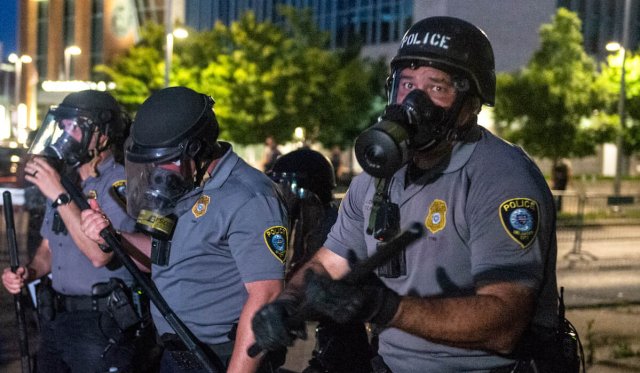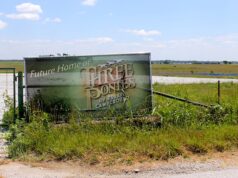

About 140 people attended a two-hour town hall about policing in Oklahoma City held via Zoom Monday night by 21 CP Solutions, a firm contracted by the city to consult the Oklahoma City’s Law Enforcement Police Task Force and Working Group.
The topics covered included police training and culture, particularly in light of the city’s high per-capita rates of police shootings. Dozens of citizens spoke during the meeting, and the conversation included painful personal stories and expressions of frustration over the slow pace of reform within the Oklahoma City Police Department.
None of the OKCPD’s top-level staff, including Chief Wade Gourley, took part in the town hall. OKC City Council members JoBeth Hamon, Todd Stone, Nikki Nice and James Cooper were among those listening in along with City Manager Craig Freeman.
‘A broken culture’
The culture within the city’s police department was a recurring theme from participants who spoke.
OKC resident David Meadows said he and his wife attended one of the local protests last summer in the wake of the killing of George Floyd by Minneapolis police. He said that afterward they went to a downtown restaurant only to encounter several officers preparing to head toward the protests.
“We pulled into the parking lot and we witnessed five or six dressed in tactical gear getting ready to go to the protest,” Meadows said. “During that time, each and every one of them had a sinister smirk on their face. One was acting like they were cocking their gun. We need to have grace for the police, and it shouldn’t be a reflection of the police force as a whole, but the observation made that day is it’s not just one bad apple spoiling the bunch, but a broken culture in which the attitudes and heart posture of people serving us and the community is no longer under the construct of serving and protecting, rather it’s men looking to be combative.”
City employee Lakesha Dunbar recalled a conversation she had with several police officers who spoke disparagingly of the largely Black east side of OKC, apparently unaware aware that she lives there.
“They made comments just in general conversation about the east side, maybe not knowing that I live in that area,” she said. “I chose to live on the northeast side because I want to support the community, but the officers had a negative response to that area in the conversation. Like some of the others that spoke before said, I think it’s a culture issue just as much as anything.”
Dunbar said the officers’ comments about her community were offensive.
“Not everyone that lives in an area with high crime activity is doing bad things,” she said. “That part of the (police) culture needs some work and more thought on how they respond to people in different communities.”
Shooting victim’s mother speaks
Cameo Holland, the mother of 15-year-old Stavian Rodriguez, who was shot and killed by police in November, provided some of the most impassioned moments of the town hall when she addressed what happened to her son.
The five officers who shot Rodriguez after he attempted to rob a convenience store were charged with manslaughter by Oklahoma County District Attorney David Prater on March 10.
“Five Oklahoma City police officers killed my child, my 15-year-old child,” she said. “No matter what he did that led up to the confrontation, they didn’t have to kill my child. And they have continued to lie about it. And have continued to ignore my requests for information or any basic communication in any way. The stuff they’re doing is bigger than what they did to my child, and if they keep getting away with it, they are going to keep doing it.”
Holland added that being white didn’t keep her son safe from police.
“It’s completely true white privilege does exist and people of color are disproportionately killed by police,” she said. “But at the same time, if you’re a white person that doesn’t fit like they think you should fit, or look like they don’t think you should look, they don’t care about your life either.”
Personal stories told
Criminal justice activist Adriana Laws said her brother was so severely beaten by OKC police that he now has a twitch. She said she lost a cousin who died after being tasered by police while she was on drugs and having a panic attack.
Jabee Williams, local activist and rapper, said his first encounter with police came when he was just a child.
“The first time I had a gun pointed at me was when I was 5 years old,” he said. “I got put inside the back of the police car, and I remember them putting my dad in the back of the same car. That was OKCPD.”
Williams also a recalled a more recent incident in which he says he was pepper sprayed by police without justification.
“When Bennie (Edwards) got shot, we showed up and they say it was a protest, but it wasn’t a protest,” he said. “It was people who loved Bennie and who were checking on their loved one. I was sprayed in the face with pepper spray by police, and I didn’t even say a word to them. It’s just so disheartening to have to continue to say these things over and over again. Policing is a culture, and the culture of policing is escalation.”
Contract controversy revisited
The OKC City Council awarded a $193,000 contract to 21CP Solutions in December to work with the city’s task force on policing, which was formed following last summer’s protests. 21 CP Solutions, which facilitated Monday’s town hall, bills itself as a consulting firm that helps communities solve public safety problems.
“We empower communities across the country to develop and implement equitable and integrity-driven public safety — grounded in building trust and strengthening relationships,” the firm’s website reads.
The contract with the firm has been controversial, however, as some feel lit just adds another layer of bureaucracy.
“I want you all to imagine how it feels to have been saying these things to our leaders for years, and instead of speaking to us they have you all speak to us,” Williams said. “It’s insulting to our intelligence.”
Jess Eddy said the city’s contract with 21 CP is just more of the same.
“It’s a $190,000 contract, and we see no product,” Eddy said. “It seems like this is the furtherance of the perpetuation of this bureaucratic layer that has been set up between the community and change.”
Related




















